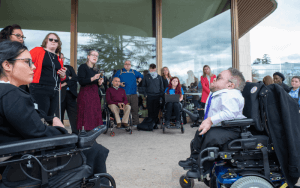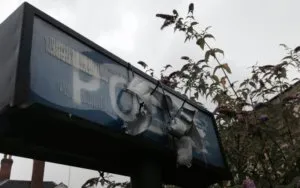By Tom McDonough
A user-led digital inclusion service has changed the lives of more than 5,000 isolated and digitally-excluded people, helping them combat loneliness and connect to vital services, according to one of the organisations behind the scheme.
The Tech to Community Connect programme, run by the disabled people’s organisation Surrey Coalition of Disabled People and the carer-led charity Action for Carers Surrey, provides devices, digital literacy training and confidence-boosting IT support to Surrey residents thought to be at high risk of both digital exclusion and isolation.
This can include disabled people, carers, older people, people with long-term health conditions, refugees, and people from minoritised communities.
Sylwia Squires, project manager of the Tech to Community Connect service, said: “People have benefitted in so many ways.
“It’s reduced their loneliness and digital exclusion and improved their access to information and even their quality of life by helping them live independently.”
She added: “We had one participant who wouldn’t leave their house because of their mental health issues. Thanks to this project, the person can now live an independent life.
“They order their groceries and prescriptions online and contact their GP via the internet too. They’ve stopped being reliant on others for daily tasks.”
A disproportionate number of disabled people experience exclusion from the internet, with 15 per cent having never gone online, compared with just six per cent of the general population, while 81 per cent of disabled people in the UK have used the internet recently, compared to 92 per cent of the general population, according to the Office for National Statistics.
And while there has been little change in internet use among UK adults aged 16 to 44 in recent years, the proportion of those aged 75 years and over who are recent internet users has nearly doubled, from 29 per cent in 2013 to 54 per cent in 2020.
In Surrey, the coalition estimates that 200,000 residents lack at least one of the skills necessary to fully participate in digital services.
Evidence suggests that those who do not use the internet are more likely to feel isolated from others and less likely to access vital services such as banks and utilities.
To tackle this, the Tech to Community Connect programme lends people devices such as tablets, smartphones or other technology, and matches them up with volunteer “Tech Angels”, who provide them with the support they need to use the devices and connect to the web.
The devices are loaned out on a long-term basis, which is reviewed every six months, with members allowed to keep the device for as long as they need it or buy it at heavily discounted prices at any point.
Those who don’t have internet connections at home are either assisted to set up Wi-Fi hotspots or loaned devices with sim cards that include enough data to allow users to surf the internet.
The programme is also assisting people who face additional barriers to accessing technology, such as deaf or blind people or people with motor control issues, by supporting them to use communication aids.
Most of the funding for the programme comes from the Better Care Fund, which aims to support the integration of health and social care.
Squires said: “So far, just under 1,100 members have benefitted from having a tablet loaned and/or support given in learning how to use technology and access the internet.”
Yolanda, a Whyteleafe resident who has diagnoses of depression, anxiety and agoraphobia, explained how the programme helped her stay occupied and connected to others via Zoom during the pandemic lockdowns.
Initially unable to join in online activities because she lacked a tablet or computer and found it difficult to use Zoom on her phone, she was referred to the programme and loaned a tablet.
She said: “When you have mental health issues and you can’t get out, the tablet means you’re not isolated – you can reach out in other ways.
“I’ve been feeling more included in things I can’t physically get to.”
She added: “Also, Facetiming my family has really improved my life – I hadn’t seen my sister for months on end.”
Yolanda’s experience chimes with that of other project participants.
The coalition’s latest impact assessment showed that, according to participants, the programme has improved relationships among 78 per cent and communication among 81 per cent of them.
For those looking to expand their social activities, the programme offers virtual social groups.
Squires, who estimates that at least 4,000 Surrey residents have joined these groups, said: “We have a virtual activity every day of the week and a virtual trip to an interesting place every month.”
Although the project was not set up to help people financially, and the financial benefits are not being monitored, Squires is confident Tech to Community Connect is also helping to ease the pain of the cost-of-living crisis.
She said: “A lot of the participants are shopping online now, and we do teach them that and how to look for cheaper energy providers.
“And we have also helped homeless people to look for and find a job and accommodation.”
Besides disabled people, carers and older people, the programme also targets people from minoritised communities, with a new worker dedicated to supporting people from this group.
Russia’s war on Ukraine has forced many Ukrainian people to take refuge overseas, with several thousand heading to Surrey in 2022.
Squires said: “The refugees from Ukraine need access to technology and data to learn the language and look for jobs.
“We’ve organised a number of group sessions for refugees and for people from ethnic minorities who don’t speak English. Our hands are full, even after the pandemic.”
Picture: One of the project’s tech angels (right) supports a Tech to Community Connect participant
This news story is part of an ongoing Disability News Service series that highlights the vital work being carried out by the UK’s disabled people’s organisations
A note from the editor:
Please consider making a voluntary financial contribution to support the work of DNS and allow it to continue producing independent, carefully-researched news stories that focus on the lives and rights of disabled people and their user-led organisations.
Please do not contribute if you cannot afford to do so, and please note that DNS is not a charity. It is run and owned by disabled journalist John Pring and has been from its launch in April 2009.
Thank you for anything you can do to support the work of DNS…

 Government’s response to UN committee ‘was insult to disabled people’
Government’s response to UN committee ‘was insult to disabled people’ Neighbours are most frequent disability hate crime offenders, report suggests
Neighbours are most frequent disability hate crime offenders, report suggests Campaigners converge on Downing Street to warn of rail ‘mass exclusion’
Campaigners converge on Downing Street to warn of rail ‘mass exclusion’